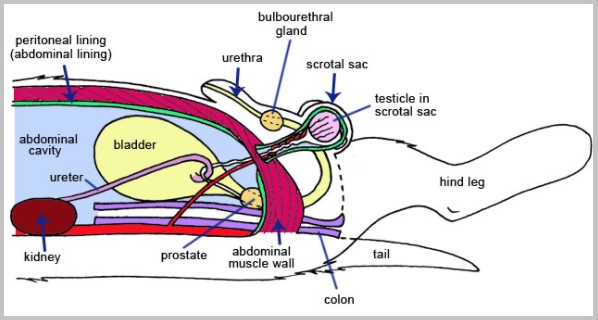 Male Dog Neutering: Case of Golden Retrievers
Male Dog Neutering: Case of Golden Retrievers
Male dog neutering can be a rather touchy topic but it has some very practical benefits.
The term neutering simply means to de-sex an animal. Technically it can refer to both females and males. But for some reason the term is more commonly associated with males.
Maybe that's because most men can't stand the word castration. They shudder at the mere idea of a scalpel going "down there."
For the sake of our discussion about male dog neutering, we'll limit the term neuter to a reference to males.
The female equivalent is called spaying.
What Does Male Dog Neutering Involve?
Male dog neutering or surgical castration basically removes both of the testicles, leaving the scrotum intact and unharmed.
Most people are surprised that the incision isn't right on top of the scrotum. In fact, a small incision is made just in front of the scrotum and the testicles are removed from there. This small incision used for male dog neutering heals much more quickly and painlessly.
Fido's empty scrotal sac will hang empty but shrink down in size over time.
After a few weeks, you'll barely even notice it. Once Fido gets neutered, his man-habits will slowly diminish over time. In other words, he'll be less aggressive, hump less, and potentially mark his urine less frequently.
Unfortunately, his metabolism may slow down a bit in the process, so keep an eye on him and cut back on the amount you're feeding him if he starts to gain weight.
Another key thing to remember with male dog neutering is that just because Fido's testicles were removed doesn't mean you can throw him back to all his lady friends immediately.
He can still impregnate one within a few days of his neuter, as those persistent sperm hang around in the tubing for a few more days.
After neutering a male dog, it takes a week or so for his hormones to settle down. During this recovery time, your reliably housetrained pooch might make a few mistakes in the house.
Don't freak out. This is a perfectly normal situation after neutering a dog, and does not mean you have to start housebreaking him all over again.
Just limit his access in the house (perhaps he can spend more time in his crate) and take more long walks with him than usual. Everything will be back to normal in a couple of weeks.
[AdSense-A]
Benefits of Male Dog Neutering
Is neutering male dogs really necessary? Most veterinarians think it's a good idea.
Here are some benefits of neutering that you may want to consider:
- Neutered dogs tend to be less aggressive
- Your dog won't contribute to pet overpopulation
- Territorial marking is reduced
- That means marking both indoors and out
- Chance of testicular cancer is eliminated
- Chance of prostate cancer is reduced
- Male dog neutering tends to make pets gentler and calmer
- The urge to mate is eliminated
- The inclination to roam is reduced
- A neutered dog is often easier to train
- That's because he can concentrate better on you
- He doesn't have to deal with the distraction of lady dogs
- If your dog isn't championship breeding stock, you should strongly consider neutering him.
Best Age For Male Dog Neutering
What's the best age to neuter a dog? Surgical castration can take place as early as six weeks, but generally only animal shelters and rescue organizations do it that young.
They want to know that when they release their pups to new homes, they won't contribute to pet overpopulation.
Some breeders may also choose to have puppy neutering performed on their pet-quality pups before selling them at about eight weeks of age.
In general, neutering a dog becomes safer after he's had all his puppy vaccines (about four months of age) and weighs a bit more. Taking all factors into account, most veterinarians prefer to have male dog neutering take place at around five to six months of age.
Neutering older dogs involves the same surgical procedure as for younger ones.
The only difference is that younger dogs heal faster.
If you wait until your dog is geriatric, he runs a greater risk of problems from the anesthesia.
Actually, that's true of any surgery for older dogs.
For some people, the question of when to neuter their dog is an emotionally charged issue. If they just keep putting it off, there's another factor to consider.
Research reveals that neutering a male dog before sexual maturity (6-12 months) is often more effective in reducing or eliminating aggressive behavior than if you wait until he's older.
Opinions vary on this subject, but the evidence favors performing male dog neutering before pups begin demonstrating their maleness.
If you aren't planning to show your Golden Retriever, or perpetuate a perfectly healthy, champion bloodline, do yourself a favor and take Sam in for a snip-snip and be done with it.
He won't be mad at you, I promise.
[AdSense-A]
Similar Articles :
1- Golden Retriever Lifespan .
2- Tramadol For Dogs : Dosage and Toxicity.
3- Can Dogs Eat Grapes Or Not?.
4- Golden Retriever Breed Standard.
5- Find Good Golden Retriever Forum.
6- How To Stop Your Dog From Biting .
7- My Dog Ate Chocolate What Should I Do? .
8- Golden Retriever Health Problems Issues.
9- How To Deal With An Golden Retriever Dog.
10- How To HOW TO STOP YOUR DOG FROM BITING.
11- Worming / Deworming Your Golden Retriever Puppies.
12- How To Deal With An Aggressive Golden Retriever Dog.
13-The Rabies Reality : Are Golden Retrievers Susceptible To Rabies
14- The Phases Of Rabies & Preventative Measures For Golden Retrievers
15- How To Remove A Tick From A Dog : Case Of Golden Retrievers
 Male Dog Neutering: Case of Golden Retrievers
Male Dog Neutering: Case of Golden Retrievers